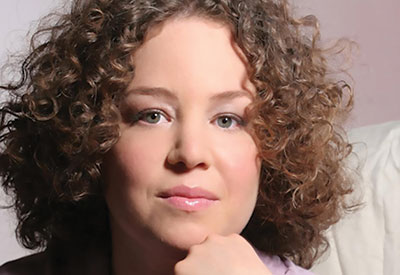Lost in America
Zot ani, Iowa (It’s Me, Iowa) is a slim memoir of Galit Dahan Carlibach’s residency at the University of Iowa’s prestigious International Writing Program, during which she underwent a complete mental breakdown, commencing an affair with a local musician before murdering him and dumping his body in the Mississippi. That is, it’s not an actual memoir at all but a very dark comedy taking wild fictional liberties in Philip Roth fashion with the happily married (and not homicidal) writer’s real-life 2016 stint at the Iowa program.
Born in 1981, Dahan Carlibach grew up in a religious Moroccan family in Sderot and published her debut novel in 2010. She has had considerable success in Israel as a writer for both adults and children. Her fantasies, Arfile’ah (Fogland) and its sequel, are popular among Israeli children. Her 2017 novel Sufah shel Alis (Alice’s Storm), longlisted for the Sapir Prize, is set in a fictional moshav populated by characters as charming and quirky as the ones who seem to inhabit comedies of small-town Scotland such as the film Local Hero. Yet none of this quite prepares one for her new book.
From the beginning, Dahan Carlibach’s alter ego has irreverent fun with the political pecking order at the program, referring throughout to herself and the other participants by the names of their countries:
My credit score in IWP-land was pretty low. Of course I’m not completely white and my mocha-colored skin—because of which many mistook me for someone of Latin origin—bought me a higher score, and then I’m a woman, but in comparison with Kenya, or gay Nepal, or occupied Palestine, my rating was meaningless, and I was stuck between Iceland and Sweden, countries thought to be inappropriately fortunate.
There is an encounter described in similarly wry and deadpan fashion between Israel and Palestine in an organic grocery store, where Palestine has forgotten his passport and so can’t use his credit card. Israel offers to pay, but Palestine storms off, insulted. “The other countries looked at Israel as if I had personally invaded the territories in ’67 and callously conquered each house and village myself.”
Israel’s literary agent encourages her to have affairs with enemy countries: A memoir about a tryst with Palestine or Iran would surely sell like hotcakes. Indeed, we are told that Israel’s most successful book so far is a novel entitled Love Without Borders, “a love story between a Palestinian and a Jew against the background of the Second Intifada” that won accolades and got her the residency. One notes the sly wink here at Dorit Rabinyan’s Gader haya, a novel with the same plot that was catapulted to fame when Israel’s Education Ministry rejected it for inclusion in Israel’s high school curriculum. Controversy sells.
Book sales notwithstanding, Israel has her eye on a local American musician named Dustin, on whom she projects all ofher Middle Eastern fantasies about a wholesome life among the cornfields. Poor guy. In a reversal of Roth’s Portnoy, the neurotic Jew in this book is the Israeli who has found her golden sheygetz. Dustin expects their relationship to be over after a one-night stand, but Israel is not put off so easily. Stalking him, she goes so far as to join his Methodist church, insinuating herself into a friendship with his parents based on her newfound passion for antiabortion activism. “I want to be your wife,” she tells the alarmed Dustin. “To stuff you with Thanksgiving turkey.”
I loved the dark and politically incorrect humor of Zot ani, Iowa. It will not be to everyone’s taste, though I suspect it will be funnier to American readers than Israeli ones, as the former are more easily able to see the comedy in Dahan Carlibach’s cornfield fantasies. In any event, the book is fair warning that, jumping from moshav to fantasyland to the University of Iowa, Dahan Carlibach is good at defying expectations, especially those of self-definition. As her alter ego tells Dustin when he asks if her life story is true: “Based on a true story—magic words for a best-seller.”
Another new book that, coincidentally, appeared earlier this year within a few weeks of Zot ani, Iowa and features Israelis wandering the groves of American academe is Maya Arad’s Ha-morah le-ivrit (The Hebrew Teacher). Arad, as readers of the Jewish Review of Books will know (see Alan Mintz’s “Reader, I Adopted Him” in the Winter 2016 issue), lives in Palo Alto and often takes the experience of Israelis residing in America as her subject. The three novellas that make up her new book all concern Israelis who live in the United States and make their living in connection with academia or high tech. If this sounds like a narrow sociological vein to mine, all the more credit to Arad, who is one of the most talented Israeli novelists of her generation and who here offers profoundly moving and universal vistas of experience, sorrow, and humor by observing her local reality with humane intelligence.
The first of these three tales focuses on Ilana, who has been teaching Hebrew language classes at a midwestern state university for decades. Born and raised in Israel, she is married to an American Jew and has made her home in the United States. She loves Israel, though. She loves sharing its language and culture with her American students—though, sadly, the number of these students has been declining in recent years. Still, she evinces a boundless eagerness to teach young Americans introductory Hebrew, to promote the reading of Israeli authors by the local Jewish community, and to spend Israeli Independence Day with Hillel students doing advocacy work at a campus table as Arik Einstein and Rita sing from her CD player. (Her sense of contemporary Israeli music expired along with her tech savvy sometime in the 1990s.) Ilana often notes that she was born the same year as the Jewish state, and this twinning is very much reflected in her sense of identity as a proud, if somewhat outdated, representative of Israel to the American community in which she lives.
And now successful fundraising among Jewish donors has led to the creation of a tenured faculty position in Hebrew literature at the university. At long last, Ilana will have a colleague who shares her love for Israeli culture! As a mere adjunct (albeit with four decades of service), she of course has no say in the hiring process. Still, she is thrilled at the prospect, even if Yo’ad, a recently minted PhD by way of Columbia and Berkeley, was not her preferred candidate. She gives him a warm welcome.
Alas, the warmth is not mutual. Yo’ad does not share Ilana’s love of Israel. He supports BDS. He does not even like Hebrewmuch—his research is on “Heidegger as a Jewish writer,” and he matter-of-factly admits that he hardly reads literature (in contrast to philosophy and literary theory). He certainly prefers the company of his colleagues in comparative literature to the ethnically Jewish professors who have cobbled together a Jewish studies program. When the campus Hillel asks him to speak to students during Sukkot and the local synagogue asks him to lead a book club discussion, he not only declines but is insulted. “I’m a comparative literature instructor,” he snaps, “not a summer camp counsellor in the Catskills.” No Zionism or ethnoreligious provincialism for him, he has even changed his last name, Harari, to Harari-Bergman in order to “re-diasporize” his identity. If Yo’ad receives tenure, it is all but certain that Ilana’s achievements, modest yet the work of years and a labor of love, will vanish like the kibbutzim of yore. Portrayed with coruscating authenticity, the conflict between Ilana and Yo’ad reveals fault lines running through both higher education and the Jewish world at large.
In the second story, an Israeli grandmother, Miriam, invades her son and daughter-in-law’s comfortable life in Palo Alto for a three-week visit to spend time with her little grandson, Yonatan. Arad observes the responses of this Israeli of an older generation to the exotic and unfamiliar aspects of her son’s Bay Area life, from yoga classes to the Costco in Sunnyvale to, more painfully, the long days Yonatan spends at his preschool instead of with his grandmother. The visit only highlights the gulf that has grown between Miriam and her family, though its poignancy is studded with humorous touches, as when Miriam is thrilled to meet who she thinks is another little Israeli boy in her grandson’s preschool before realizing that the child’s name is “Owen,” not the (to her ears) identically sounding “Oren.”
As I read the story, I could not help comparing it to an earlier novella dealing with Jewish immigrants, Americanization, and family conflict: Yekl (1896), by the writer and famed editor of the Forverts, Abraham Cahan. Arad takes Cahan’s late 19th-century portrait of immigrant culture shock and flips it around for an early 21st century in which the old world—or is it the new world?—is Israel and the Yekl-become-Jake is a Yoram-become-Yuri. Shut out by her children and struggling to create a connection with her Hebrew-averse grandson, Miriam even sounds a parallel complaint. “A curse upon Columbus,” says Cahan’s rueful immigrant Gitl about the distance America seems to have put between her and her husband. Miriam, sitting in a Starbucks and reflecting on the loneliness she both feels and identifies in her American family, sighs: “That’s the problem . . . There are no grandmothers here.”
Yet there is nothing tendentious about Arad’s stories. She touches, gently, on a range of sociological patterns—the shaky status of Hebrew among the American children of her Israeli characters, for instance, and the looser, sometimes nonexistent family ties in America as compared with Israel—but her purpose is not to offer critique but to observe her characters in their all-too-human complexity. In the third tale, a mother struggles to help her 13-year-old daughter navigate the cruel hierarchies and rituals of adolescence in the age of Instagram and Snapchat. The daily negotiations (and persistent sense of failure) surrounding screens and phones and earbuds will be familiar to many parents of teens today. The subject affords more than a few soapboxes, but Arad chooses not to stand on them, instead examining how parental concern can sometimes be a displacement of the parent’s own insecurities.
Arad’s stock-in-trade is a rare mix of intellect and warmth. Her previous book, Me-ahorei ha-har (Behind the Mountain, 2016), is a mystery novel that takes place over Thanksgiving in the snowbound California vacation home of a wealthy Israeli tech mogul. The “detective,” as it were, is a failed academic whose métier is detective fiction and who has been invited to give a series of lectures on the subject. Arad’s presentation of academic analyses of the mystery tropes she is simultaneously exploiting is exceedingly clever. Yet, as with Ha-morah le-ivrit, she first and foremost makes you care about the characters, Israelis making their way as best they can in America and in life.
Suggested Reading
Culture and Education in the Diaspora
After 1948, Ben-Gurion strongly urged young American Jews to make aliyah. In 1951, Hayim Greenberg, head of the Jewish Agency's Department of Education and Culture, came to Jerusalem to argue for the dignity of Jewish life in the diaspora—in Yiddish.
Maimonides in Ma’ale Adumim
Rabbi Nachum Rabinovitch has been working on his commentary to the Mishneh Torah for the last 41 years. It may be the greatest rabbinic work of the century.

Persian Daughters of Israel
Leah Sarna imagines Jewish and Gentile women doing their laundry on the banks of the Tigris, sharing tricks for keeping their headscarves tied and their bedrooms pure. She reviews Shai Secunda’s new book on just how Babylonian the Babylonian Talmud was.

Rabbi Ovadia Yosef and the Halakhot of Hostages: Part II
When Israeli citizens were taken hostage in Entebbe in 1976, Rabbi Ovadia Yosef was asked if hostages could be exchanged for terrorists. What can his towering responsum teach us about the current moment?


Comments
You must log in to comment Log In